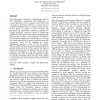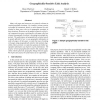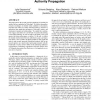IUI
2006
ACM
14 years 5 months ago
2006
ACM
Recovering semantic relations between different parts of web pages are of great importance for multi-platform web interface development, as they make it possible to re-distribute ...
HT
2006
ACM
14 years 5 months ago
2006
ACM
In this paper, an approach for the implementation of a qualitybased Web search engine is proposed. Quality retrieval is introduced and an overview on previous efforts to implement...
HT
2006
ACM
14 years 5 months ago
2006
ACM
One of the basic methods of web usage mining are association rules that indicate relationships among common use of web pages. Positive and confined negative association rules are ...
HT
2006
ACM
14 years 5 months ago
2006
ACM
We present Opal, a light-weight framework for interactively locating missing web pages (http status code 404). Opal is an example of “in vivo” preservation: harnessing the col...
ADC
2006
Springer
14 years 5 months ago
2006
Springer
Web information extraction is a fundamental issue for web information management and integrations. A common approach is to use wrappers to extract data from web pages or documents...
WEBI
2007
Springer
14 years 5 months ago
2007
Springer
Many web pages and resources are primarily relevant to certain geographic locations. For example, in many queries web pages on restaurants, hotels, or movie theaters are only rele...
WEBDB
2007
Springer
14 years 5 months ago
2007
Springer
Search engine quality is impacted by two factors: the quality of the ranking/matching algorithm used and the freshness of the search engine’s index, which maintains a “snapsho...
WEBDB
2007
Springer
14 years 5 months ago
2007
Springer
This paper pursues the recently emerging paradigm of searching for entities that are embedded in Web pages. We utilize informationextraction techniques to identify entity candidat...
SOFSEM
2007
Springer
14 years 5 months ago
2007
Springer
In the research area of automatic web information extraction, there is a need for permanent and annotated web page collections enabling objective performance evaluation of differen...
PKDD
2007
Springer
14 years 5 months ago
2007
Springer
Detection of template and noise blocks in web pages is an important step in improving the performance of information retrieval and content extraction. Of the many approaches propos...



